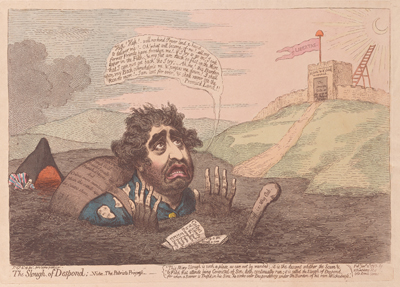The Slough of Despond
By January 1793, when this print appeared, Charles James Fox's continued support of the French Revolution was losing him long-time friends and supporters. Edmund Burke, of course had fallen out with him in a very public display in May of 1791. But now that the reports from France of the gruesome September Massacres of 1792 had reached England and the fates of the French King and Queen seemed more dire with each passing day (King Louis was eventually executed a few weeks later on January 21), moderate Whigs had begun to distance themselves from Fox—in some cases seceding from the Whig club, in others actively exploring a third party option centered upon the Duke of Portland.
In 1782, Gillray had used a Biblical reference to Ahitophel (Ahithophel in the Dumps to portray the desperation of Fox at losing the support of his fellow ministers in opposing a new prime minister, Shelburne. Here in 1793, he borrows words and imagery from perhaps the best-known Christian allegory, John Bunyan's The Pilgrim's Progress, to show a similarly despondent Fox up to his neck in a miry slough of his own making.

© Beinecke Rare Book and Manuscript Library, Yale University
Help! Help! – will no kind Power lend a hand to deliver me? – Oh! what will become of me? – all my former Friends have forsaken me! – if I try to go on, I sink deeper in the Filth; & my feet are stuck so fast in the Mire, that I can not get back, 'tho I try; - Ah me! – this Burden upon my Back overwhelm's me, & presses me down! – I shall Rise no more! – I am lost for ever, & shall never see the Promis'd Land!!
The slough itself, as described in the caption to Gillray's print, is much like the description in Bunyan. But Gillray emphasizes Fox's "Wickedness."
| Bunyan | Gillray |
|---|---|
| This miry Slough is such a place as cannot be mended; it is the descent whither the scum and filth that attends conviction for sin doth continually run, and therefore is it called the Slough of Despond: for still as the sinner is awakened about his lost condition, there ariseth in his soul many fears, and doubts, and discouraging apprehensions, which all of them get together, and settle in this place; and this is the reason of the badness of this ground. | This Miry Slough in such a place as can not be mended; – it is the descent whither the Scum & Filth that attends being Convicted of Sin, doth continually run; it is called the Slough of Despond, for when a Sinner is Trap'd in his Sins, he sinks into Despondency under the Burden of his own Wickedness. |
That "Wickeness" is elaborated in the details surrounding Fox in the mire—all of them stemming from his support of the French Revolution. Behind him, for instance, we can see that his hat, now fallen from his head, is marked with the revolutionary tri-color cockade. Then, in front of him, is "Gospel of Liberty" which, instead of the Bible, he seems to have been using as his guide book. It includes gospels by four of the most notable revolutionary "evangelists":
- Richard Price, the non-conformist preacher, whose comparison of the French Revolution to the Glorious Revolution of 1688 in A Discourse on the Love of Our Country (November 1789) had first prompted Burke's attack in Reflections on the Revolution in France
- Thomas Paine whose hugely popular Rights of Man was a detailed defense of the French Revolution and a rebuttal of Burke's Reflections
- Joseph Priestley, dissenting minister and scientist, whose support for electoral reform and the revolution in France led to his house and lab being destroyed by an angry Birmingham mob on the second anniversary of the fall of the Bastille
- Jéróme Pétion de Villeneuve, French writer, reformer, and revolutionary Mayor of Paris
Next to the "Gospel of Liberty," also embedded in the mire, is the Patriot's staff i.e. the Whig Club which strongly supported revolutionary ideals and opposed the war with France. And on his back, adding to his burden of guilt, Fox carries a bundle labeled "French Gold, French Loyalty, French Daggers/ And /Crimes, more num'rous than the sands, upon the Ocean's shore"*—all suggesting a loyalty (bought or given) to France and a complicity in plots to overthrow the British government, as Burke had famously claimed in Parliamentary debate. See Gillray's The Dagger Scene, or the Plot Discover'd (1792).
But we can see what Fox can't—that Fox's goal of a revolutionary Libertas, if he could make it through his despondency, is one of empty promises. The Straight Gate which ought to lead to the Celestial City (in Bunyan) ends in a ladder which while it aims at the moon arrives at nothing.
* Gillray may be remembering the Protestant hymn which includes the verses:
Behold the streams of sacred blood
Behold his pierced side
What hath drawn forth this copious flood
And swell'd this flowing tide
My sins, as numerous as the sands
Upon the ocean's shore.
Sources and Reading
- Commentary from the British Museum on The Slough of Despond.
- "Charles James Fox," Wikipedia
- "The Pilgrim's Progress," Wikipedia
- "The Portland Whigs, 1792-4," The History of Parliament
- Thomas Wright and R.H. Evans, Historical and Descriptive Account of the Caricatures of James Gillray #90
- Thomas Wright and Joseph Grego, The Works of James Gillray, the Caricaturist; With the History of His Life and Times, p. 165.
Comments & Corrections
NOTE: Comments and/or corrections are always appreciated. To make that easier, I have included a form below that you can use. I promise never to share any of the info provided without your express permission.